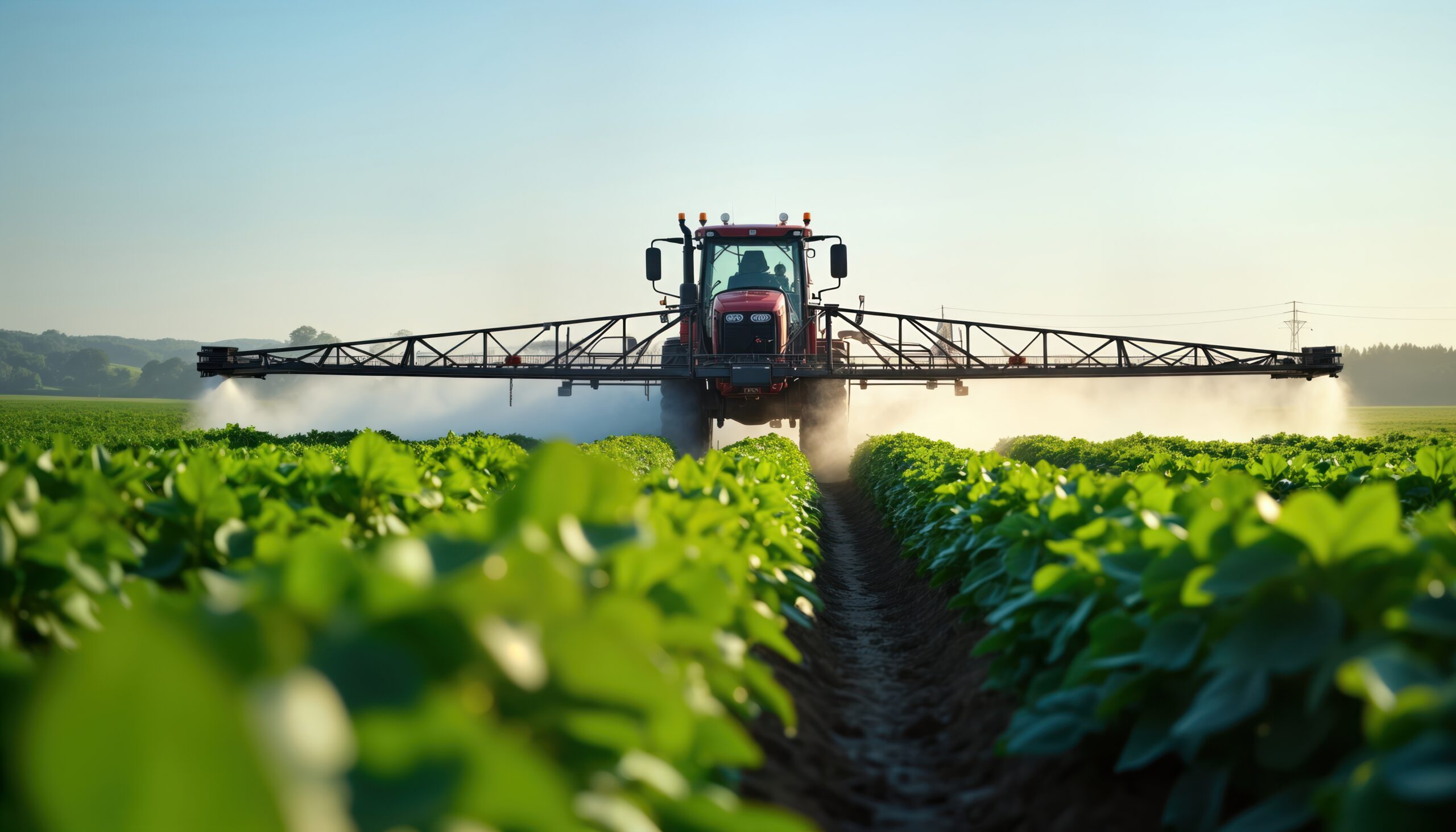Why Glyphosate is So Bad for People and the Environment
Have you eaten an apple today or a bowl of cereal with berries on it? How about steak or corn on the cob? If you ate anything at all today, chances are, you have ingested glyphosate. In fact, according to a CDC report, 81% of the population has recently been exposed to glyphosate. This conclusion was made after a massive study examining urine samples nationwide. This same CDC report declares glyphosate exposure can occur through diet, skin, breathing, fruits, vegetables, and cereals.
Glyphosate is in Roundup, the most heavily used herbicide on the planet. Glyphosate is found throughout our entire food chain because Roundup is sprayed on our lawns and parks, directly on our crops, and on animal feed. The heavily sprayed chemical makes its way to the water supply. There is really no escaping it – even for the legislators. They live on the same planet and breathe the same air as their constituents.
Glyphosate Regulation – or Lack of
Our government regulators have always tolerated high levels of glyphosate in our food and tap water. “Safe levels” have been found to be too high, according to independent studies. Until recent years, most of the public was not aware of the potential risks. But that is changing—a health-conscious generation is waking up to the risks of glyphosate contamination.
Georgia HB 144
That is why, recently, the citizens took notice when our own Georgia legislature passed Senate Bill 144. Essentially, the Georgia General Assembly chose to abdicate to the EPA (federal regulatory agency) when it comes to who determines the conditions of liability protection. In summary, the bill fails to protect the health of citizens and our farmers but protects Bayer/Monsanto, the purveyor. (There is an excellent analysis of that bill here).
Who Do they Work For?
It’s hard to fathom that the government elected to represent its constituents would align itself with protecting a chemical and drug company with assets over 116 billion in revenue! It is well known that glyphosate increases the risk for cancer not only in humans, young and old, but also in our animals. The World Health Organization even admits to the cancer-causing potential of glyphosate. It also notes that it is the largest used herbicide in the world.
“Glyphosate currently has the highest global production volume of all herbicides. The largest use worldwide is in agriculture.” The World Health Organization
Let’s face it. Governments no longer support their constituents, as many people believe. It seems that the government protects its own interests. It’s baffling – why would the government protect a chemical company that harms just about every aspect of our ecosystem?
How Does it Work?
The glyphosate found in Roundup was designed to kill weeds and insects to protect crops for consumption by people and animals alike. But what does glyphosate really do? If it’s designed to kill weeds, which are also plants. How do the crops stay alive while killing the weeds? Are the crops somehow stronger or just naturally resistant to the toxin? How do the crops survive the toxic spray? The answer? The same company that makes the chemical glyphosate also created seeds for crops resistant to glyphosate. You probably know of this as GMO food. We were told it was created to resist the toxin so that the crop sprays would only kill the weeds and insects that destroy the crops. We were also told that with the world population, this is the best remedy to protect food for human consumption. But at what cost?
A Closer Look at Glyphosate
Let’s dive into how this product works. Glyphosate is an herbicide. It is designed with other ingredients to help it choke out natural plants while those created to withstand the spray survive. The crop seeds are altered to produce pesticide-producing crops, so they protect themselves, so to speak, by resisting the spraying. Or better yet, the crops don’t need to be sprayed because when the insects attack it, the crop itself will kill it! When the crop is sprayed, the weeds will die, which helps the crops survive.
The Price of Killing Insects
Ponder this – glyphosate is designed to kill insects! What happens to them? The toxin goes into their body and blows up the insect from the inside. That’s what glyphosate does to insects, which is likely contributing to the drastic decline in bees several years ago! It was difficult to find local honey because of the bee shortage! Some of us recall it well. Local bee farmers were struggling. Some people had difficulty getting the honey, which helped with their allergies.
The Price to Humans
Guess what happens when we eat genetically modified food or food sprayed with an herbicide that is impossible to remove completely? Plants readied to absorb glyphosate don’t break down the chemical. So the food we eat is saturated, causing trouble for our bodies. Glyphosates (like any chemical) cause risks to the kidneys and liver.
There’s more. It causes leaky gut syndrome! Many of us never heard of leaky gut when we were kids. It didn’t exist. A leaky gut is described as perforations in the gut that allow undigested food to escape into the bloodstream before it’s digested. That sets off alarms in the body because undigested food in the bloodstream is foreign to that environment and triggers adverse effects like allergies! Sometimes, those allergies can manifest as asthma, celiac, or other autoimmune disorders. The worst side effect is cancer! It gets absorbed into the skin and causes inflammation again because it is foreign to the body’s ecosystem. Research shows it’s rarely inhaled once it drops to the surface, but it takes time to dry.
Pets, Food, and Water
When pets or any animal encounter the chemical before it dries, it can impact them, too. That’s why lawn companies use flags to warn people to keep their kids and pets off the ground for several hours. That’s not the end of it. It also seeps into the ground, destroying nutrients like minerals that enhance foods for their nutritional benefits. It washes down the drains into our water supplies. The chemical has infiltrated just about everything in our environment. Bees aren’t as plentiful to pollenate; earthworms don’t enrich the soil as much. It also impacts organic farming within a short range from air pollination and water runoffs.
Monsanto’s Attack on America’s Heartland
Then there are the heartbreaking stories of farmers that many of us can’t forget. Years ago, Monsanto started to strong-arm the farmers of America’s heartland with an army of private investigators (called the “seed police”), leading to “fines” for using patented seeds without permission. Those that didn’t settle with Monsanto found themselves in court. Monsanto was going after their farms! This tragic, complicated, and largely untold story has changed the foundations and traditions of farming that endured for centuries in the US and worldwide.
What To Do
The best we can do to protect ourselves is to get educated on what we eat and how to reduce exposure. Drinking plenty of clean water to flush the body and detox regularly makes sense! (This is not medical advice). The best our government could do would be to support regulation of the product in our state and explore avenues for supporting organic farming. It is logical to assert that the cost of healthcare would drop significantly with the reduction of autoimmune diseases. This, in turn, would lower the state’s cost of healthcare.
The Health of Our Legislators is at Risk
What benefit was there for our legislation to pass HB 144 and close the door to discussion with informed and concerned citizens? The product was already classified as a probable carcinogen! Are our elected officials unaware they are breathing the same air and drinking the same water as the rest of us? What do these representatives eat? Are they concerned about their own families’ health? Why wouldn’t our government want healthier communities?
Money VS Life
The adage always seems to be, “Follow the money.” But is money more valuable than life? The ultimate cost of not listening could be high for everyone. Even legislators are unwittingly putting the health of themselves and their families at risk. Are we trying to become one of Bayer’s largest customers? Are we trying to feed into their pharmaceuticals as well?
Who Do Our Representative Listen To?
It is appalling that our representatives would even consider such a bill! It’s even more disturbing that so many representatives voted on it despite a constant barrage of angry and concerned citizens protesting its passage. Could they be that indifferent to their constituents? Before the final vote of passage, they knew that many of us had been addressing this issue with them! Why weren’t they listening to us? Perhaps a better question would be who they were listening to. If they knew about the situation, more people would be outraged. The populace is unlikely to agree on a vote to reduce the options to deal with the Roundup situation.
Who Do We Support?
Many organic farmers have proven that growing crops alongside weeds is possible. Some may need to be uprooted, but many farmers have learned to adapt their crops around the weeds and preserve their farms and the environment. These farmers need our support Our government needs to do better. The people don’t elect them to be a destructive element. Perhaps future discussions should center around who we vote out and who we vote in.
Want to learn how to do something about this and other issues? Join in here!
References:
- Diet Is a Factor in Contact with Glyphosate CDC National Biomonitoring Program Nov 3, 2022 https://www.cdc.gov/biomonitoring/featured-work/diet-is-a-factor-in-contact-with-glyphosate2.
- Glyphosate in food and water https://detoxproject.org/glyphosate-in-food-water 3.
- IARC Monographs Volume 112: evaluation of five organophosphate insecticides and herbicides Agency for Research on Cancer, World Health Organization https://www.iarc.who.int/wp-content/uploads/2018/07/MonographVolume112-1.pdf4.
- Glyphosate as a direct or indirect activator of pro-inflammatory signaling and cognitive impairment NIH National Library of Medicine https://pmc.ncbi.nlm.nih.gov/articles/PMC11034589/
Disclaimer: This article is not intended to provide medical advice or to diagnose, therefore the information in this article is not in any way suggesting that any of your health conditions are caused by eating certain foods. Nor is it suggesting that detoxing or eating an organic diet will lower the level of glyphosate in your body or improve any health conditions you may have.





